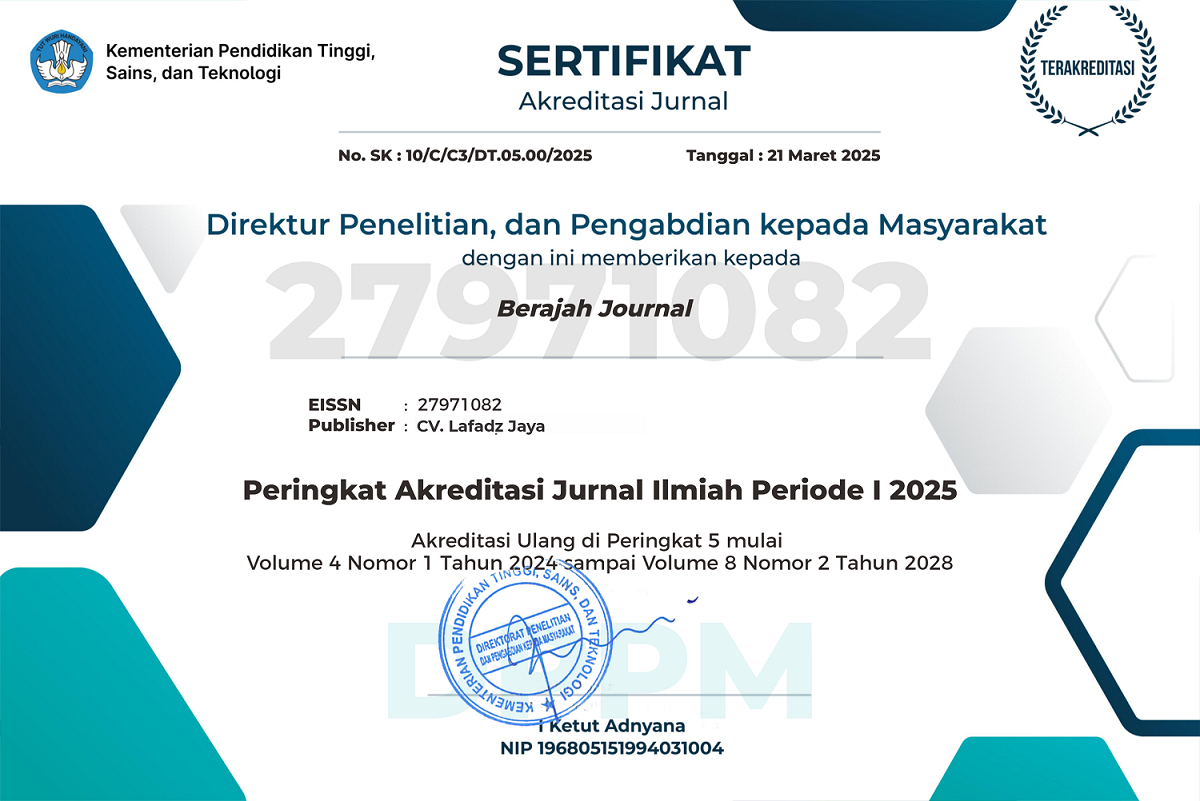NEED ANALYSIS ON TEACHING MARITIME ENGLISH FOR NAUTICAL STUDENTS AT POLTEKPEL SURABAYA: CURRENT PRACTICES AND FUTURE DIRECTIONS
DOI:
https://doi.org/10.47353/bj.v5i2.583Keywords:
Maritime English, Need Analysis, Nautical Education, Curriculum Development, Communication SkillsAbstract
The increasing globalized maritime industry has underscored the importance of Maritime English (ME) for nautical students, equipping them with the communication skills essential for safe and efficient operation at sea. This study aims to perform a need analysis on the teaching of Maritime English for nautical students at Poltekpel Surabaya, focusing on both the existing curriculum and the future needs of students. The research examines current instructional practices, identifies gaps between curriculum delivery and industry requirements, and proposes recommendations for enhancing Maritime English teaching. Data were collected through interviews with maritime instructors, surveys with students, and analysis of course syllabus. The findings highlight a discrepancy between the level of Maritime English proficiency required by the industry and the current state of teaching at Poltekpel Surabaya. It also discusses the relevance of existing teaching materials, the integration of modern technological tools, and the necessity for a more immersive and communicative approach to ME instruction. The study concludes with actionable suggestions for improving the quality of Maritime English education, aiming to ensure that graduates are better prepared for the demands of the international maritime industry.
Downloads
References
Ali, S., & Rashid, M. (2019). The role of Maritime English in shipboard safety: A review of communication practices. International Journal of Maritime Safety, 27(1), 45-58.
Baker, S. (2018). Maritime English and safety: The role of effective communication in maritime operations. Journal of Maritime Safety, 45(2), 123-135.
Bhatia, V. K. (2016). Maritime English and communication in international maritime operations. International Journal of English Studies, 20(3), 5-16.
Carter, R., & McCarthy, M. (2020). English for specific purposes: The case of Maritime English. TESOL Journal, 34(3), 40-52.
Chan, S., & Lee, A. (2021). Technology-enhanced learning for maritime students: Focus on Maritime English skills. Journal of Educational Technology and Applications, 34(5), 23-40.
Collins, J. (2018). Language barriers in the maritime industry: Improving communication for safety and efficiency. Maritime Safety Journal, 22(4), 101-116.
Eslami, Z. R. (2019). Task-based learning in Maritime English education: An integrated approach. TESOL Quarterly, 53(4), 986-1008.
Gilson, L., & Holmes, M. (2020). Maritime English for international communication: Challenges and solutions. International Journal of Applied Linguistics, 10(2), 89-102.
Gritsenko, D., & Tsvetkova, O. (2020). Cultural communication in the maritime industry: A need for awareness in Maritime English training. Intercultural Communication Studies, 29(2), 15-30.
He, M., & Wu, J. (2020). The impact of digital tools in enhancing Maritime English communication skills. Journal of Technology in Maritime Education, 25(3), 91-104.
Helms, D. (2017). The need for specialized Maritime English programs for non-native speakers. International Journal of Maritime Studies, 12(2), 134-145.
Kermani, M., & Roudaki, J. (2018). The role of English proficiency in the maritime industry. Journal of Maritime Research, 35(2), 72-85.
Lee, C., & Yang, T. (2017). Language use in maritime communication: A case study of the IMDG Code. Maritime Law Review, 17(3), 64-75.
Lin, H., & Chen, M. (2020). Teaching strategies for Maritime English: A case study of a maritime academy. Maritime Education and Training Review, 21(1), 44-57.
Liu, W., & Zhang, Y. (2021). Enhancing Maritime English proficiency through task-based learning: A case study. Language and Communication in Maritime Contexts, 17(4), 56-69.
Ochoa, A., & Ruiz, S. (2018). Developing intercultural communication skills in Maritime English. Maritime Communication Journal, 21(3), 112-126.
Sadeghi, H., & Sadeghi, N. (2020). Bridging the gap: Theory and practice in Maritime English teaching. English for Specific Purposes, 28(1), 123-139.
Shaw, J., & Lister, S. (2019). Language competence in maritime education: Bridging the gap between theory and practice. Journal of Educational Research in Maritime Studies, 33(2), 78-90.
Simpson, R., & Griffiths, M. (2021). English language training for the maritime industry: An overview of current trends and future needs. Journal of Maritime English and Communication, 32(4), 190-202.
Sun, J., & Wang, D. (2020). A review of the Maritime English curriculum: From theory to practice. Educational Research and Review, 30(4), 99-110.
Tang, Z., & Liu, P. (2020). Teaching Maritime English through technology: Benefits and challenges. Journal of English for Specific Purposes, 28(3), 124-135.
Tseng, F., & Han, Y. (2016). The importance of Maritime English in global shipping and safety protocols. Maritime Education and Training Journal, 18(1), 1-10.
Wang, Y., & Li, Y. (2020). Developing communicative competence for maritime students: A task-based approach. International Journal of Language and Communication, 11(1), 23-36.
Witte, L., & Kormos, J. (2017). Challenges in learning Maritime English for non-native speakers. Journal of Language for International Business, 13(4), 40-53.
Xu, H., & Li, L. (2019). Enhancing Maritime English teaching through technology: A study of virtual simulation in maritime education. Journal of Maritime Education & Development, 44(2), 128-142.
Yamaguchi, M., & Imanaka, K. (2021). Communicative competence in Maritime English for safer navigation. Journal of Maritime Communication Studies, 22(4), 123-137.
Yoon, H., & Kim, J. (2019). A study of Maritime English in the context of safety communication. Journal of Language for Specific Purposes, 22(2), 35-48.
Zhang, C., & Li, X. (2020). Using simulations for Maritime English teaching: A case study at a maritime university. Journal of Applied Linguistics in Maritime Education, 25(1), 78-89.
Downloads
Published
How to Cite
Issue
Section
License
Copyright (c) 2025 Ita Faradillah

This work is licensed under a Creative Commons Attribution 4.0 International License.






















